By Nathaniel R
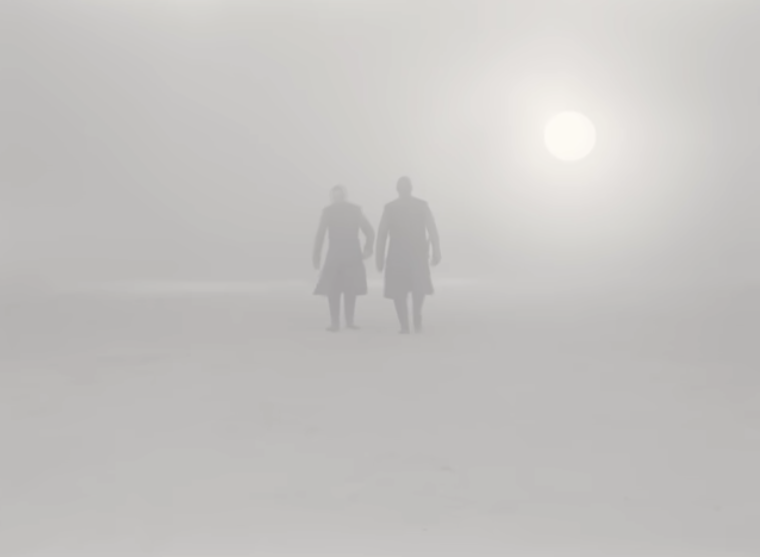
“When” is the first word of Shakespeare’s Macbeth, uttered by one of three witches. Though the word precedes a question it sounds more like a definitive statement in Joel Coen’s The Tragedy of Macbeth; the writer/director even grants the word its own solo title card. Later the word “Tomorrow” will also grace the screen alone. Time, we immediately understand, is at the heart of the latest big screen Shakespeare. And it’s running out. Coen’s adaptation casts two older-than-usual actors as the titular Lord (Denzel Washington) and Lady (Frances McDormand). As a result their infamous power grab plays like a violently desperate game of “last chance”…
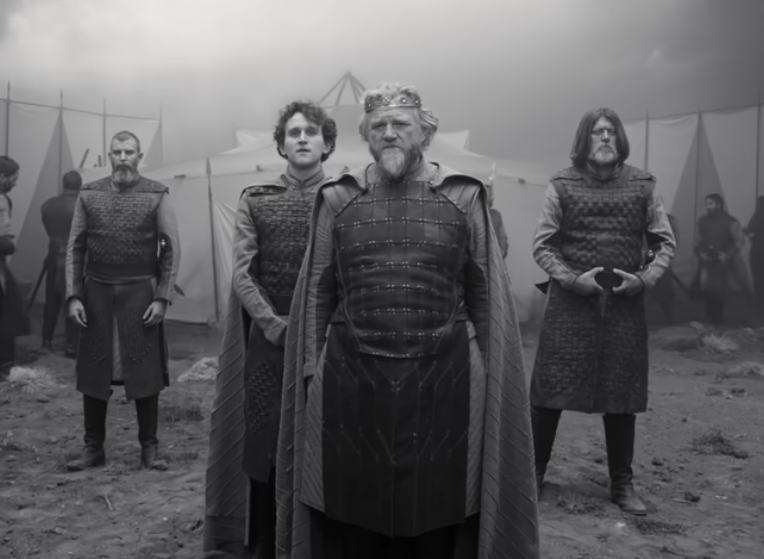
There’s little point in rehashing the classic story but if you have yet to experience the oft-produced Macbeth on the stage it (briefly) goes like so: After a hard-won victory on the battlefield Lord Macbeth hears a cryptic prophecy of power from three witches that he will become king. Encouraged by his ruthless Lady, Macbeth murders the real king in his sleep and the couple ascend to the throne. Macbeth’s guilt, especially considering the obvious framing of conveniently dead soldiers, is not lost on all the power players in the kingdom. But no one, ally or rival, is safe in any bloody coup and they all know it. The coldblooded murder haunts the new King and his Queen, leading to insanity and cascading tragedy for all.
Macbeth, like a handful of other titles from “Shakespeare’s Greatest Hits” is produced endlessly on stage. The cinema has also had its fair share of Macbeths including just recently with Justin Kurzel’s Macbeth (2015), though the most famous are surely Akira Kurosawa’s Throne of Blood (1957) and Roman Polanski’s Macbeth (1971). As with any oft produced story, the thrill each time (if any is to be found) lies in the the variation. Joel Coen, working for the first time without his brother Ethan (who wanted some time off), has come up with a restless and bold retelling. Denzel Washington makes for a commanding and memorable false King, but the new film’s true claim to lasting fame will surely be its visual design.
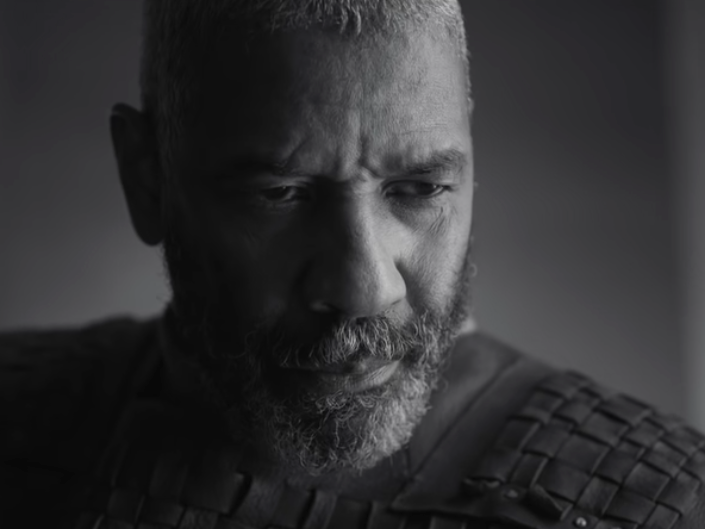
Famed cinematographer Bruno Delbonnel (Amelie, Inside Llewyn Davis, Darkest Hour) outdoes himself behind the camera. The Tragedy of Macbeth is shot with alacrity in Academy ratio and in memorable black and white. The square image traps us to drown in inky blacks and blinding whites. The lighting on the minimalist sets from production designer Stefan Dechant, reduces them to mere outlines in shadow at times. The sound work is heightened too, making sure we hear each drop of water or blood. It all has the effect of making this Macbeth feel totally abstracted and theatrical, and curiously more direct and cinematic, too. It’s as if all the usual trappings and fuss of period pieces and prestige adaptations have been burned away, leaving only the white bones of the awful crime and empty throne rooms behind. Only the players have survived the fire… and not for long.
The rush of the abridged text (at a lean 105 minutes it’s the shortest screen Macbeth by a considerable margin) and the graphic minimalism of the mise-en-scene and maximalism of the sound add considerable energy and momentum to this telling. But major triumphs, as this Lord and Lady will quickly learn, come with a price. In this case its the loss of the usual rubbernecking grotesque pleasure of Macbeth’s spiraling madness. Denzel’s Lord is immediately regretful and “off” after the murder, truncating his character arc though it’s still a joy to watch the great actor fret and fence and freak out. But it’s hard to track what’s eating this Lady Macbeth at all. Frances McDormand plays her with such matter-of-fact and almost comically soulless modern ambition, that it’s hard to fathom her eventual crack up. The famous “out damn spot” monologue, usually the highlight of any Macbeth production, plays more like a “deleted scene” for the first time. She’s much better earlier on when she’s still scheming.
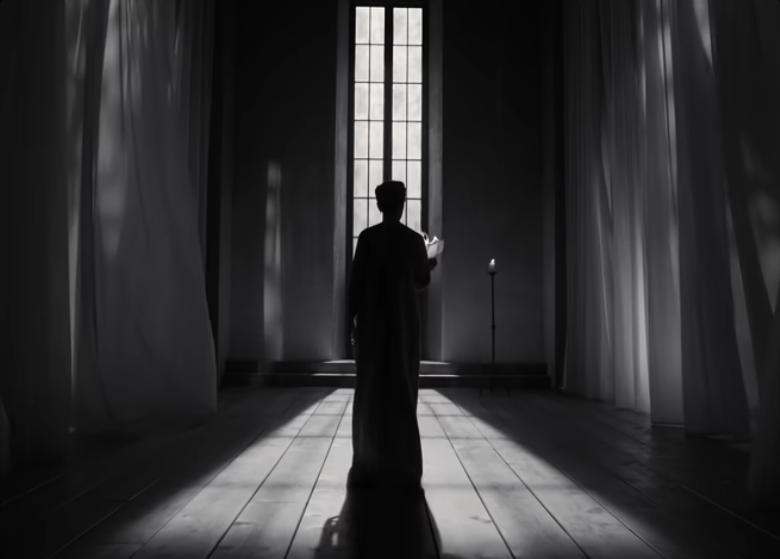
Though we get less of an arc for Lord Macbeth and less riveting emotion from Lady Macbeth, the supporting players pick up some of the slack. Ross (Alex Hassell), in particular, proves unusually interesting this time around. What’s more Hassell wears the sleek androgynous costuming with such style that designer Mary Zophres owes him if she wins the Oscar. Jefferson Mays nails a cameo as a very nervous confounded doctor. And Corey Hawkins and recent Emmy nominee Moses Ingram (The Queen’s Gambit) bring vibrant sadness and rage to their roles as the Lord and Lady MacDuff.
And, last but decidedly not least, there are the three witches. The Tragedy of Macbeth as a whole production, might not be a patch on Kurosawa’s classic Throne of Blood (my personal vote for the best Shakespeare movie of all time) but it deserves the highest praise for its visionary conception of these “weird sisters”. Lord Macbeth doesn't understand what he's looking at and we share his awe. All three of the witches are played by one mesmerizing actress in Kathryn Hunter. She sometimes stands alone, and is sometimes multiplied in reflection. The witch(es) stand erect like a statue or twist themselves into unnatural contortions like a circus performer. The result is an Unholy Trinity that haunts the whole movie, first with ancient cracked voice and then with incredible physicality. The witches have always served as narrators and (malevolent?) instigators. This time they're avatars of the movie's visual ambitions, too -- "foul and filthy", otherworldly, and unforgettable.
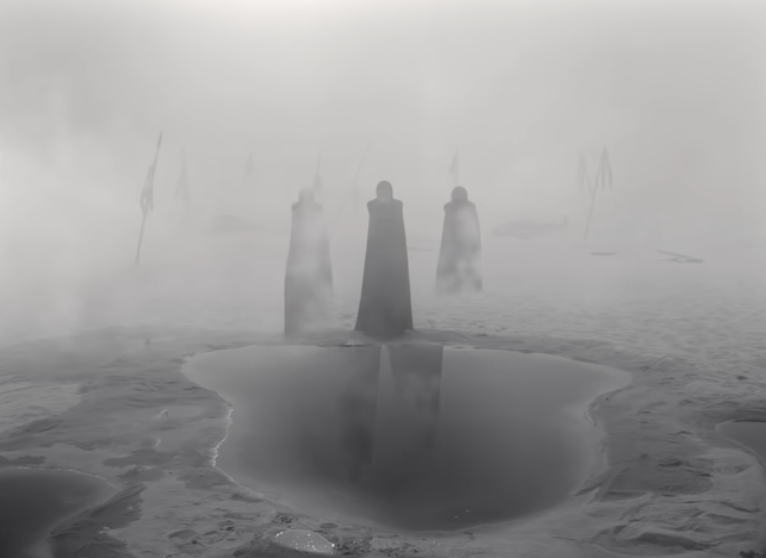
The Tragedy of MacBeth recently premiered at the New York Film Festival. It will arrive in US theaters on December 25th as well as airing on Apple TV+
Movie: B+; The Witches: A+
Oscar Chances: Yes, across the board above and below the line. Though it surely bears repeating that Shakespeare adaptations aren't as big of a deal with Oscar voters as people usually perceive them to be. So we shall see how far this one can go. At the very least it's got clear shots at nominations for Best Actor and Best Cinematography.